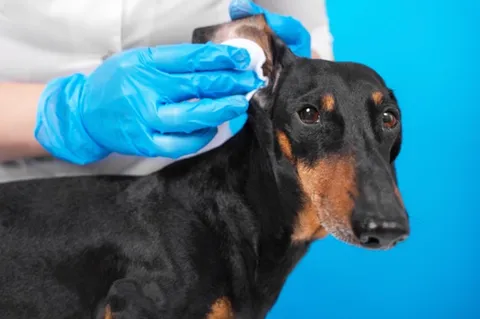Ear infections are a frequent and uncomfortable ailment for many dogs. The ear is a vital organ responsible for balance and hearing, processing sounds and relaying information to the brain. When an infection occurs, it can cause significant pain for your canine companion. Understanding how ear infections develop is crucial for prevention and prompt treatment.
What Causes Ear Infections in Dogs?
Bacterial overgrowth in the ears is the most common culprit behind dog ear infections, leading to inflammation and swelling. This can stem from external factors like water entering the ear after swimming, or internal issues such as allergies or parasites. Sometimes, the cause of an infection may not be immediately apparent.
How to Identify an Ear Infection in Your Dog
If your dog is exhibiting unusual behaviors like persistent head shaking or excessive ear scratching, it could signal discomfort due to an ear infection. Look for any discharge from their ears: yellow or green fluid often indicates a bacterial infection, while brown or bloody discharge may suggest a fungal infection, which is more common in cats.
Key symptoms of a dog ear infection include:
- Frequent head shaking or tilting, and scratching at the ears.
- Holding their head at an unusual angle.
- Redness inside the ear or around the ear flap.
- Visible irritation or signs of fatigue due to ear pain and itching.
Types of Dog Ear Infections
Dog ear infections are categorized by their location within the ear:
Otitis Externa
This infection affects the outer ear canal and can be caused by bacteria, fungi, or yeast, resulting in inflammation and redness. Dogs with otitis externa often scratch their ears incessantly and shake their heads, and a foul odor may emanate from the ears. Common triggers include swimming, allergies, and ear mites. In rare instances, cancerous lesions on the skin might be the cause, but it’s essential to consult a veterinarian to rule out other possibilities before focusing on otitis externa. Traditional treatment involves antibiotics and antifungal or antimicrobial ear drops, typically administered for about two weeks or until symptoms resolve. Untreated otitis externa can lead to swelling around the face, but proper treatment usually clears the infection within days. Preventing your dog from scratching during healing is important to avoid future bacterial overgrowth.
Otitis Media
Otitis media is an inflammation of the middle ear, the air-filled space behind the eardrum. Symptoms can include dull, aching ear pain and fever. Discharge from the affected ear or a loss of balance may also occur. Infection is the most common cause, though allergies or other conditions can contribute. Treatment varies based on the cause and severity, potentially including antibiotics for bacterial infections, pain medication for underlying causes like trauma, or warm compresses to help break down hardened earwax buildup, particularly in breeds with floppy ears that restrict airflow.
Otitis Interna
This inner ear infection is less common but often associated with ear mites. Otitis interna can lead to deafness, balance disorders, behavioral changes, and even seizures if left untreated. Symptoms may include nausea, vomiting, and fever. If your dog displays these symptoms and doesn’t respond to treatment for other ear infection types, a veterinary examination is recommended to check for complications or other underlying issues causing the behavioral changes.
Tips for Dog Ear Infection Treatment and Prevention
Maintaining your dog’s ear health is key to preventing infections.
1. Clean Your Dog’s Ears Regularly
Regularly inspect your dog’s ears for any signs of infection or irritation. If you notice redness or swelling, consult your veterinarian immediately.
To clean your dog’s ears:
- Ensure the ears are clean. Use a damp cloth or cotton ball to wipe away any dirt or buildup.
- Use an ear cleaner specifically formulated for dogs, as human products may irritate their sensitive ear skin.
- Apply the ear cleaner to a cotton ball or soft cloth and gently wipe inside the ear canal until all dirt is removed.
- After cleaning, use a clean towel to dry any excess moisture before allowing your dog outdoors.
Pro Tip: Avoid Q-Tips
While tempting, Q-tips can cause permanent hearing damage. They can push wax deeper into the ear canal, potentially leading to infections or hearing loss. Opt for a washcloth or gauze pad instead.
 A veterinarian gently cleaning a dog's ear with a cotton ball.
A veterinarian gently cleaning a dog's ear with a cotton ball.
2. Feed a Healthy Diet
A balanced and healthy diet is essential. Studies suggest that diets rich in omega-3 fatty acids, found in sources like salmon and flaxseed oil, may help prevent ear infections in dogs by reducing inflammation in sensitive areas like the middle ear or eustachian tube. If your dog experiences recurrent ear infections, consider incorporating fresh, oily fish into their diet. You might also consider supplements like best skin and coat supplement for french bulldogs which often contain beneficial fatty acids.
3. Consider Probiotics
Probiotics are beneficial bacteria that reside in your dog’s digestive tract and can be found in fermented foods like yogurt, sauerkraut, or kimchi. They support digestive health by promoting the growth of good bacteria and bolster the immune system by increasing the population of helpful microbes. Probiotics can also help inhibit yeast growth in dogs’ ears. Offering a daily probiotic, such as a canine probiotic, can significantly lower the risk of ear infections and contribute to a balanced gut microbiome.
Ear infections are a common concern for dog owners. While many are caused by bacteria or yeast and can be treated with medication, early intervention and preventative measures are key. If you suspect your dog has an ear infection, seek veterinary advice promptly. Your vet may recommend anti-inflammatory drugs, antibiotics, or other treatments based on the specific type of infection. To help ward off future issues, consider incorporating canine probiotics into your dog’s routine, even after an infection has cleared or if your dog is currently healthy.
